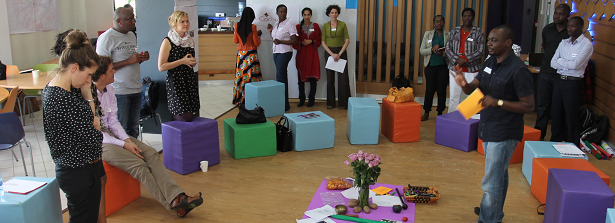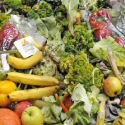Successful Wicked World – Bee Collective session in Nairobi on reduction of potato losses

On November 20, 2015, Bee Collective, Wicked Problems Plaza, Postharvest Network and the Food & Business Knowledge Platform (F&BKP) organized a Wicked World – Bee Collective session titled, “Potato losses, Value chain efficiency and Food security” in the Nailab, an innovation hub for social businesses in Nairobi, Kenya. The session formed part of the Bee Collective Festival in which various wicked problems were addressed on several locations over the world. Part of the festival was the possibility to set up new organization forms called Pop Up Companies to start further acting upon these problems. In total, 18 people from the private, public and civil society sector with various backgrounds, most of which in agriculture value chains and also from a more general social entrepreneurship background, followed the call to reflect on the wicked problems of the potato value chain in Kenya.
Upon arrival, the group of “bees” shared on a market place with displays they had prepared what their companies and organizations were already doing in the field. Professional facilitators from Art of Hosting Kenya opened the session and showed a video message from the Netherlands in which Nina Waldhauer of the Dutch Postharvest Network explained their motivations plus those of Bee Collective, Wicked Problems Plaza and the F&BKP in jointly organizing the session. The central question that would be addressed during the day was “How will we together rethink the potato value chain in order to reduce food losses and improve chain efficiency and food security?”. The session referred to background information on the issue that was sent to participants beforehand.
Next, participants were invited to start by sharing the metaphors they individually brought as a contribution to the conversation. The symbols represented their views on wicked problems and varied from pictures of shabby storages and cooperation, to bags and packages of potato chips. The environment of the session allowed attendees to speak comfortably and from the heart. Afterwards, the group discovered who everyone was and then individually brainstormed on questions addressing what they wanted to learn on the value chain parts, from farming, transport and storage, processing, wholesale, to retail and the consumer level. “What delays potato decay?”, “what can be new value addition products?” and “how do we take the rejects to other users in a cost efficient way?” and many other questions and issues were brought forward here.
Working on those matters as a team, the group had the chance to discuss the pressure points of challenges and opportunities in a creative World Café setup. The changing of tables to blend ideas and questions from one table to another was exciting and fun. The clustering of the group’s main insights to understand which actions would be most impactful strongly revealed the complexity of the post-harvest losses. The most critical topics that came up were market, storage and information flow in the potato value chain. Participants felt that more detailed information and additional powerful stakeholders are needed.
As one of the highlights of the day, the group was invited to host and participate in smaller conversation sessions where they could explore follow-up questions, networking connections, project ideas and topics they felt passionate about and want to bring to the next level. The Open Space Technology allowed the attendees absolute freedom to create their own sessions, contribute to one or more conversations and take time to reflect. They dove deeper into ideas and questions concerning, “what alternative processing forms are good for Kenya?”, “in how many ways do food losses occur and what is the magnitude of loss along the potato value chain?”, “what would it take to structure the potato value chain – policy, advocacy, other?”, “how to consolidate information flow on good agricultural practices to increase yield and link market-traceability and quality?” and “how to provide the right storage/logistics without just extracting value?” The break out meetings’ outcomes varied from the organization of additional stakeholder meetings, to playing with new products, research and mapping of potato farmers into groups, to capacity building, to developing a wholesale price information platform.
After a short lunch break, the group built a council of wise community members and reflected on what they had co-created so far. They did so with the information at hand regarding what are barriers to progress and how to overcome them. The topics that were brought to the table covered more of the macro-level that is interfering with the potato value chain, including corruption and power structures. Attention was also paid to nutrition value and the fact that value chain efficiency is not equal to food security. On the local level, the group observed the special role middlemen play (traders, brokers). For this “donkey work”, these middlemen receive a range of a little to a lot of money however they hold a very important role in the overall process. There was a discussion point about the eventual elimination of the middlemen in order to provide the farmers direct linkage to the markets and also how to involve the middlemen in the next conversations.
The participants eventually concluded that there are no barriers if everyone has the will to progress and the urge to collaborate, test new alliances and synergy ideas at their final Open Space conversations. In the last round, the following questions were discussed: “Can we create a way for middlemen to earn conventionally?”; “can we build an Information Dissemination Platform”; and “how can we make use of potatoes that don’t meet market specifications?” The small groups supported each other on what the resulting design tasks to undertake should be. A more detailed anonymized harvest report on the content of the session will be published shortly.
It certainly was a full and intensive event with lively and valuable qualitative input from the group. At the end via Livestream, the group linked back its findings to the bigger community of Bee Collective participants in the other sessions in the Netherlands and Brazil. The participates in Kenya soon became aware of the global community they were contributing to and that they weren’t the only “bees” working towards solving wicked problems. Shortly with support from the various organizing organizations, the group and the other bees will discuss concrete steps to take in the future, for example in Pop Up Companies. In any case and as witnessed at this Bee Collective session in Nairobi, there are enough ideas and energy to bring this wicked potato problem in Kenya a step further in the forward and right direction.
Download the report “Bee Collective harvest from Nairobi” with a summary of the wicked potato session.






